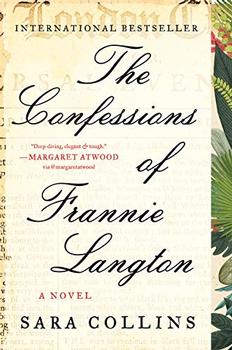Summary | Excerpt | Reading Guide | Reviews | Beyond the Book | Readalikes | Genres & Themes | Author Bio

She said something else, which I fancied was about her own life and therefore not my concern. She was gazing out the window when she said it too. 'I've lived too many years in a place where the snakes lurk in the house as well as the grass.'
Because she had said she was to be my mother, I chanced a question. 'How long am I to stay?'
She had a high colour on her throat, her hands flittered like a frog's legs, and she looked at me and then away, as if I was the sun and gazing at me too long would hurt her eyes. I thought it strange that she should be so overcome when I was the rough creature brought up to her from the swamp and she the great lady of the house who was giving me pity surely as she was giving me johnnycakes. Miss-bella was frightened of me.
But then she said something that turned my attention sharp in another direction, as if a john crow had just flown into the room. 'However long it is will be too long in the end.'
Chapter Three
That was 1812. Nobody told me why I'd been brought to the house and I was too busy burying my nose in clean cotton and kitchen scraps to puzzle about it. They said I was seven years old, or thereabouts. No one ever stirred themselves enough to be sure. I never had a birthday, or a mother. When I asked her, all Phibbah would say was my mother had run off. 'You won't magic one up by asking,' she said. 'You going learn. We not the ones ask the questions, we the ones answer them. And the answer always yes.'
When I close my eyes now, I see Phibbah swiping her cloth at the cane settee in the receiving room, tilting it to sweep under. I see the campeachy chairs put right in the middle to catch a breeze, the carpets sent to Miss-bella by her sister in Bristol that curled up in our heat like they were trying to rest. The dining room where the porcelain cups and platters and the blue and white teapot rattled in the sideboard. I hear Phibbah hissing, 'Ga-lang, pickney, just get out of my way. Why you can't just leave me be?'
It was my job to polish the brass and put the flowers out on Miss-bella's breakfast table, fan the flies off her food. But mostly I trailed the house, thinking of ways I could stick to Phibbah, like an apron. She grumbled while she worked, complaining that her old bones were rattling like stones in a calabash, that whoever dreamed up the colour white never had to be somebody's laundress, that white people's furniture never did nothing except breed more furniture. I liked the way her every word was birdsong, through the space in her teeth. Four of them missing right where my own new ones had just come in.
She'd been the one to pull mine out, so I asked her, 'Phibbah, who pulled yours?' Oh, I worried at her like waves on sand. Children are all blindfolds and hammers. Cruel because of what they don't know.
She told me it was none of my business. 'You don' remember it,' she said.
'Why?'
'It happen before you born. Nobody remember a thing from then.'
Most days she did nothing but curse, but in the right mood she fed me scraps of hominy straight from the pot, or a slice of one of her corn cakes. When she sat outside the cook-room in the morning picking peas, and tapped her hand beside her in the dirt, it meant she'd set a few there for me, beside the washbasin. I'd creep over and scoop them into my palm, her arm tickling right beside mine. But she'd never turn, never look at me.
Peas snicking into pewter, Phibbah's smell of coal, and the ley ash and aloe she mixed into soap. If I kept quiet, she might tell a story. But she had to work up to it, like a wave you can see coming from far out. First, she said, she had to find her story breath, which wasn't the same as her living one.
My favourites were the ones about the house.
'Only one reason white man ever build pretty-pretty house like this,' Phibbah said. 'You hooks worms to catch fish. After him come from England and finish him house, Massa send him letter to Bristol. We sabi sure as night going come, white woman going come. Sure enough Miss-bella come running ‒ bragadap! – same way guinea fowl come running when corn drop.'
Excerpted from The Confessions of Frannie Langton by Sara Collins. Copyright © 2019 by Sara Collins. Excerpted by permission of HarperCollins Publishers. All rights reserved. No part of this excerpt may be reproduced or reprinted without permission in writing from the publisher.
Be sincere, be brief, be seated
Click Here to find out who said this, as well as discovering other famous literary quotes!
Your guide toexceptional books
BookBrowse seeks out and recommends the best in contemporary fiction and nonfiction—books that not only engage and entertain but also deepen our understanding of ourselves and the world around us.